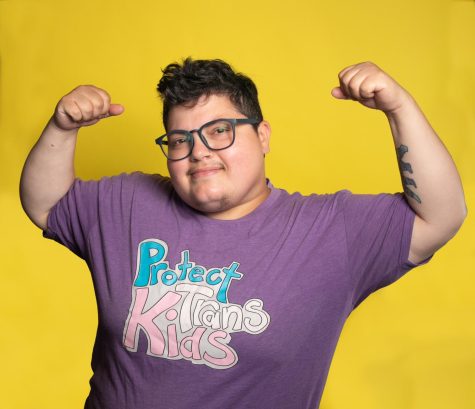GENDER SPICY. Keynote speaker Shor Ayzik Salkas discusses their gender identity and the various contributing factors that framed the way they think of gender.
Community takes a deep dive into gender on Speaker Day
SPA alum discusses gender identity, expression and authenticity
Kicking off speaker day, the community welcomed Shor Ayzik Salkas, an SPA alum, public health professional, and healing-centered coach, as the keynote speaker.

Salkas began by introducing themselves as a first-generation, white assimilated Jewish, queer, disabled, and transgender nonbinary individual. They explained that the intersectionality and context of their identity are crucial to their work and how they interact with others. Salkas has been working as a public health and equity practitioner across different governmental sectors and local communities for many years. Through this work, they have developed a deep passion for activism, working with people, advocating for their rights, and helping them along their healing journey.
“In my work, I am accountable to people like me and who are invisible in systems,” they said.
In their presentation, Salkas reflected on their journey with sexuality and gender identity or expression, while also exploring the complexity of gender in society today. “Gender is all the ways we experience ourselves in the world […], and the story about gender is continuously being written,” they said.
By unpacking key aspects of their upbringing and transition into adulthood, Salkas highlighted the role that intergenerational relationships play in developing one’s sense of self and shaping notions of gender that individuals are born into and raised with.
“My earliest experiences of gender pre-date my consciousness and analysis of gender,” they said.
Salkas believes that ancestors pass down certain values and beliefs based on their lived experiences, which creates the cycle of intergenerational resilience and healing. They shared that their grandparents came to the United States to escape anti-semitism during the Holocaust, and that assimilating into American life impacted their perspective on differences.
“My grandparents wanted to fit in, so they wouldn’t be picked out,” they said.
Salkas reflected on how this idea of trying to avoid differences that could be easily identified was passed down and largely fueled the idea that it was important for Salkas to be feminine growing up because that is what they were “supposed to do” to fit in. They recognized that this inherited value of following societal expectations was not created from a place of suppressing Salkas’s identity; rather, their family believed they were protecting them from potential challenges they could face due to their gender identity and sexuality.
Bringing their analysis to present-day issues with discrimination and legislation around LGBTQ+ rights, Salkas ended their presentation with a statement that they usually lead with when training others on gender and sexuality: “Transgender and nonbinary individuals deserve to be treated with dignity, kindness, and respect. This is the baseline, and if we can’t start here, we don’t have a lot of places to go together.”